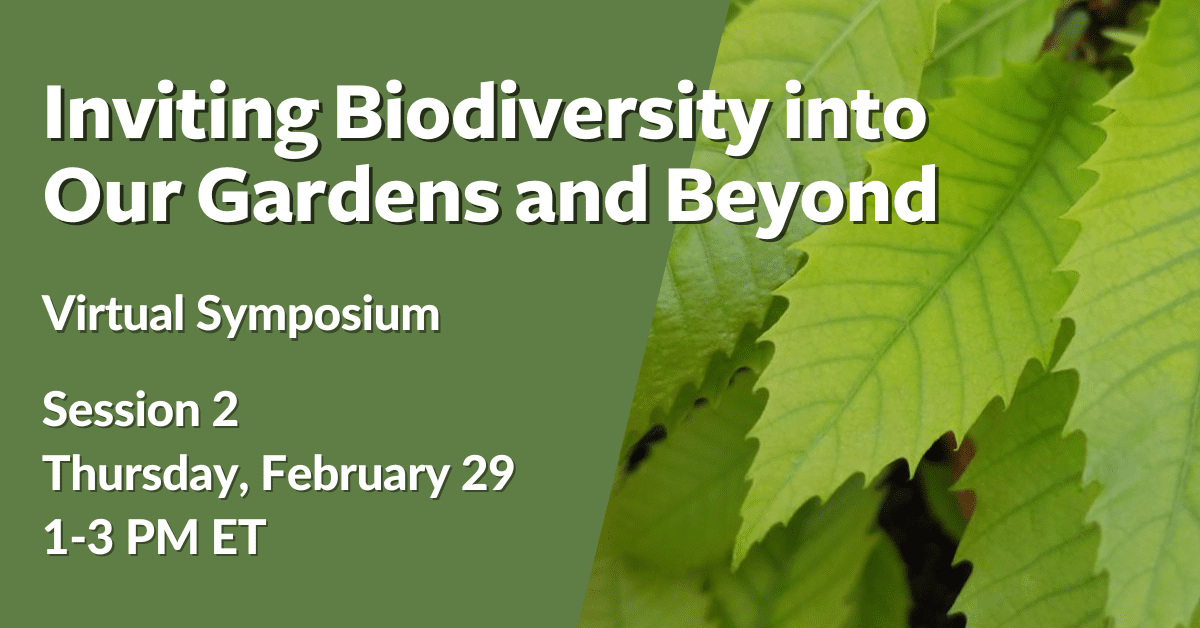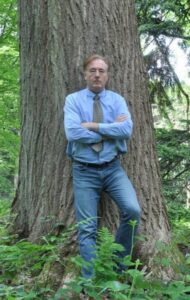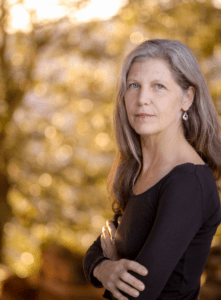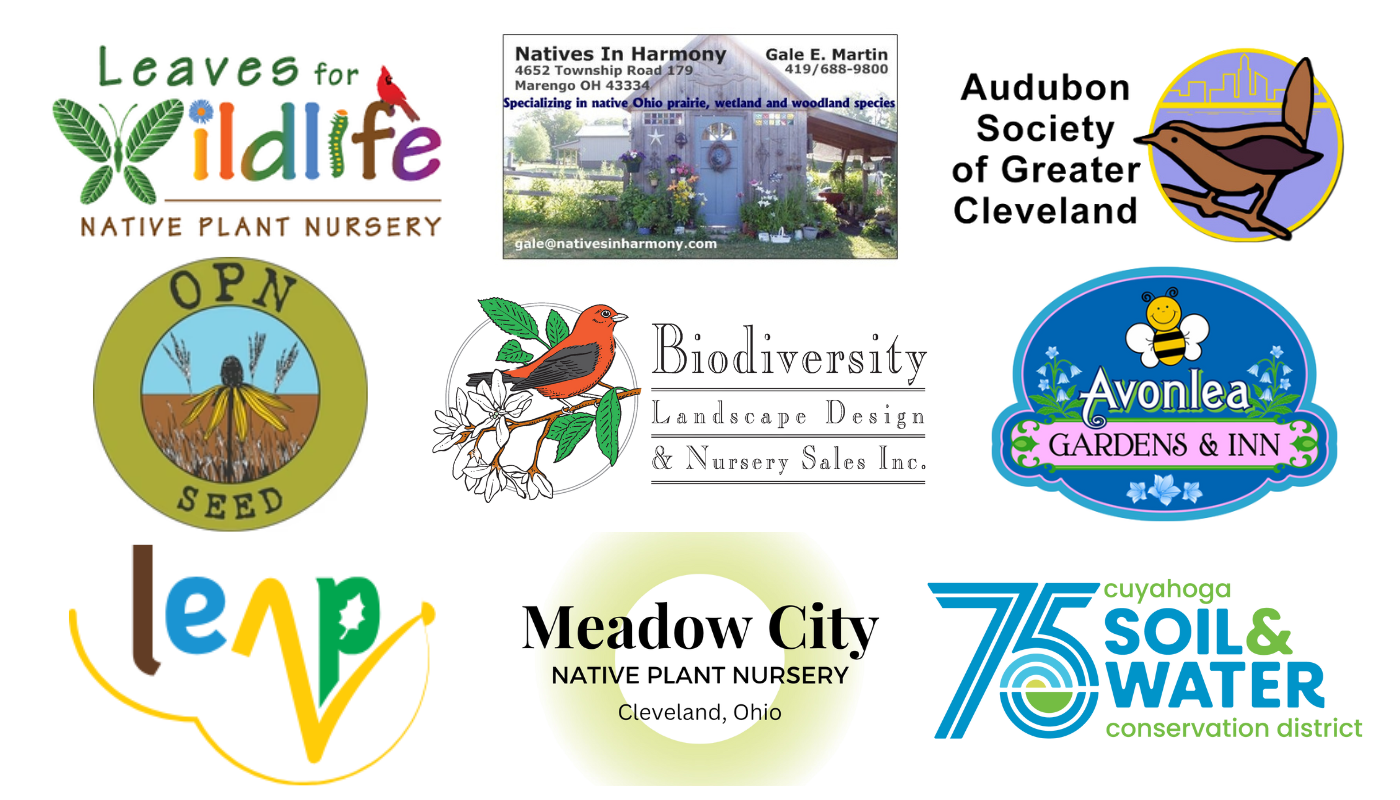

Western Reserve Land Conservancy, The Cleveland Pollinator and Native Plant Symposium and Nature Spark are pleased to announce the return of their collaborative series, Inviting Biodiversity into Our Gardens and Beyond. The symposium features nationally and regionally renowned experts to help viewers create vibrant, ecologically resilient gardens and greenspaces that benefit pollinators and wildlife. Inviting Biodiversity into Our Gardens and Beyond will inspire homeowners, horticulturists, botanists, naturalists, educators, conservationists, landscape designers, and other to learn more about the value of using native plants and trees to create and maintain healthy habitats.
This symposium is organized by Ann Cicarella of the Cleveland Pollinator and Native Plant Symposium, Judy Semroc of Nature Spark and Renee Boronka at Western Reserve Land Conservancy.

1:00 PM ET
The American Chestnut: An Environmental History
Donald Edward Davis, Author
Before 1910, the American chestnut was one of the more common trees in the eastern United States. An important natural resource, chestnut wood was used for woodworking, fencing, and building construction, as it was rot resistant and straight grained. The hearty and delicious nuts also fed wildlife, people, and livestock. However, after a blight fungus was introduced into the United States in the late nineteenth century, the American chestnut became “functionally extinct.” Although the eradication of the species caused one of the greatest ecological catastrophes since the last ice age, considerable folklore about the American chestnut remains. This presentation will briefly discuss the evolutionary history of the American chestnut, as well as its relationship to other Castanea species. It will address the impact of the American chestnut on Native American life and culture both before and after European settlement. Davis will also discuss the tree’s important influence on nineteenth and early twentieth-century American life, including the commercial nut-trade. In the Southern Appalachians, the nuts were a major element in the local economy, as whole families collected and depended on them to get through the winter. The importation of the chestnut blight fungus will also be addressed, including the tree’s decline as a dominant forest species. Finally, he will evaluate efforts to restore the American chestnut to its former place in the eastern deciduous forest, including attempts to genetically modify the species.
2:00 PM ET
The Special Biodiversity of Old-Growth Forests
Joan Maloof, Author and Conservationist
Besides being beautiful places to experience, old-growth forests are habitat for many, many organisms. In this talk Dr. Maloof will describe why old-growth forests have such exceptional biodiversity — from mosses to salamanders, fungi to wildflowers. She will also describe the Old-Growth Forest Network and the special Ohio forests that are included in it.
About the Speakers

Donald Edward Davis is an author, independent scholar, and noted environmental historian. He has authored or edited seven books, including The American Chestnut: An Environmental History (Athens: University of Georgia Press, 2021). His second book, Where There Are Mountains: An Environmental History of the Southern Appalachians (Athens: University of Georgia Press, 2000/2020), won the prestigious Philip D. Reed Environmental Writing Award of the Southern Environmental Law Center. Davis received two Fulbright Fellowships during his teaching career, completing awards in both Ukraine and Romania. He currently works remotely for the Harvard Forest as a part-time research scholar and lives in Northern Virginia.
 Joan Maloof is the author of numerous research articles and five books: Nature’s Temples (2016, 2023); Treepedia (2021); The Living Forest (2017); Among the Ancients (2011); and Teaching the Trees (2005). In addition to her research and writing, Joan founded an organization with the goal of creating a network of protected forests across the US; that organization, the Old-Growth Forest Network, now has hundreds of volunteers and thousands of supporters. Maloof works to educate others regarding the extent and condition of our forests, and to encourage their protection. Her formal education includes a bachelor’s degree in Plant Science, a master’s degree in Environmental Science, and a Doctorate in Ecology. She is a professor emeritus at Salisbury University where she taught Biological Sciences and Environmental Studies.
Joan Maloof is the author of numerous research articles and five books: Nature’s Temples (2016, 2023); Treepedia (2021); The Living Forest (2017); Among the Ancients (2011); and Teaching the Trees (2005). In addition to her research and writing, Joan founded an organization with the goal of creating a network of protected forests across the US; that organization, the Old-Growth Forest Network, now has hundreds of volunteers and thousands of supporters. Maloof works to educate others regarding the extent and condition of our forests, and to encourage their protection. Her formal education includes a bachelor’s degree in Plant Science, a master’s degree in Environmental Science, and a Doctorate in Ecology. She is a professor emeritus at Salisbury University where she taught Biological Sciences and Environmental Studies.
Advanced registration is required.
Fee: FREE
Please use this Zoom link to register for Inviting Biodiversity into Our Gardens and Beyond: Session 2
Special thank you to our sponsors:

Organizer: Renee Boronka, rboronka@wrlandconservancy.org, 216-533-8761